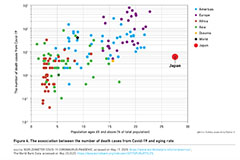Interview on COVID-19 with Principal Research Fellow Makimoto Saeda
2022.07.22
In response to the COVID-19 pandemic, JICA established a Research Team of Comparative and Pragmatic Research on Countermeasures against COVID-19, and on May 31, 2020, JICA published "To Our Friends and Partners Fighting Against COVID-19 in Developing Countries," summarizing the results of its rapid analysis and JICA’s commitment to future efforts.

We spoke to Principal Research Fellow Makimoto Saeda of the JICA Ogata Sadako Research Institute for Peace and Development (JICA Ogata Research Institute), who worked on this analysis as a member of the team, about its purpose, the message it contains and the role the JICA Ogata Research Institute should play in the future.
-Tell us the purpose and background of this analysis paper.
The COVID-19 pandemic has been causing unprecedented damage to both developed and developing countries, and it may have a major impact on the shape of the world and society in the future. JICA’s top priority partner is the people in developing countries who are now confronting COVID-19. This initiative was launched in response to JICA President Kitaoka Shinichi's strong desire to convey a message to these people about how JICA analyzes the impact of the pandemic, how JICA understands the situation and efforts in developing countries, what lessons JICA has learned from countries that were affected early by the first wave of COVID-19 to prepare for future epidemics and how JICA will engage in international cooperation going forward.
In April 2020, JICA launched the Research Team of Comparative and Pragmatic Research on Countermeasures against COVID-19, a joint team of JICA staff, JICA advisors and external experts. I participated as a health professional and also as a member of the JICA Ogata Research Institute. The team's analysis at the end of May was a quick analysis of the changing situation. In the future, this work will be transferred to a JICA Ogata Research Institute research project, where analysis and research leading to policy recommendations will be carried out.
-Give us an overview of the message of the analysis paper.
It contains President Kitaoka's message, followed by an analysis of the current situation in Japan and the rest of the world, an international comparison of COVID-19 deaths and various socio-economic factors, and a statement of JICA's commitment.
In drafting this analysis paper, it is noteworthy that JICA, which has been providing cooperation for many years in various sectors around the world, tried to leverage its strengths. In concrete terms, JICA used its network of nearly 100 overseas offices to gather information in the field and conduct interviews with its counterparts, government leaders and experts in various countries, in an attempt to gain a broad understanding of the impact of COVID-19 on society, the state of countermeasures, which demonstrate originality and ingenuity, and people's expectations for JICA.
COVID-19 spread rapidly throughout the world in a few months. However, we found that many developing country governments have been taking thorough, strong measures from an early stage, based on their own experience in responding to infectious diseases and disasters in the past, information on responses from other countries, and available scientific evidence. We also found that, amid the global shortage of medical equipment and consumables and limited assistance from developed countries, citizens have been voluntarily taking actions such as supplying goods and preventing infection in many countries across sectors. On the other hand, we also saw the actual state of social vulnerability, in which vulnerable groups are bearing the brunt of backlashes to strong countermeasures such as lockdowns. This information could be gathered even in a short period of time because each overseas office has cultivated a strong network with stakeholders through daily relationships of trust.
Since JICA has always emphasized sharing Japan's experience and practical knowledge in cooperation if applicable, it has organized information on Japan's COVID-19 response and conducted an international comparative analysis using data from international organizations. For example, we analyzed trends by correlating data such as GDP per capita, obesity rate, aging rate and urban residence rate, with the number of deaths due to COVID-19 per population.
Based on narratives from the field and more objective data comparisons, JICA will work with people in developing countries more than ever to respond to COVID-19, strengthen health systems in the medium and long term and build up communities. This is precisely the message of this analysis paper.
-Based on this analysis paper, how will the JICA Ogata Research Institute be involved in the future?
The world situation relating to COVID-19 is in constant motion and this analysis is only provisional. East Asian countries also have fewer deaths from COVID-19 than other countries, but a brief analysis conducted over less than a month has revealed some interesting things. Compared to countries with similar aging rates, Japan has an exceptionally low COVID-19 mortality rate. The low mortality rate in nursing and elderly facilities also stands out. I think many countries will be interested in our analysis of the factors behind this. Various hypotheses have been discussed, but I suppose knowledge that can be shared through international cooperation includes the role of strong medical and public health systems, measures to prevent infection in nursing care and elderly facilities, the high level of health awareness among Japanese people, and the behavior patterns of individuals to prevent infection. As one of the pillars of future research, I believe Japan's long experience in strengthening its health systems can be communicated in relation to COVID-19 measures.

Japan has a low death rate from the coronavirus compared to other countries with similar aging rates
On the other hand, COVID-19 has made us aware that we cannot adequately respond to today's threats with conventional measures to fight infectious diseases and strengthen health systems. Particularly prominent are the fact that vulnerable people are not adequately protected, the collapse of health care delivery system in many countries, and the need to address health risk factors in all sectors. We will need a more multi-sectoral approach, more scientific-evidence-based cooperation and stronger solidarity through public empowerment. Right now, researchers and practitioners around the world are working to address this threat. I hope JICA’s unique perspective will be incorporated into its projects and JICA Ogata Research Institute’s new project will contribute to addressing this threat.
■ Profile
Completed a master’s degree in science (Health Science), University of Tokyo. Joined JICA in 1995 and worked in Medical Cooperation Department. Transferred to the Expanded Programme on Immunization, Western Pacific Regional Office, World Health Organization, and served in JICA's Grant Aid Department; Planning Department; Infectious Control Division, Human Development Department; Bangladesh Office; Health Group, Human Development Department; and Laos Office. Has been in her current position since August 2017.

事業事前評価表(地球規模課題対応国際科学技術協力(SATREPS)).国際協力機構 地球環境部 . 防災第一チーム. 1.案件名.国 名: フィリピン共和国.

事業事前評価表(地球規模課題対応国際科学技術協力(SATREPS)).国際協力機構 地球環境部 . 防災第一チーム. 1.案件名.国 名: フィリピン共和国.

事業事前評価表(地球規模課題対応国際科学技術協力(SATREPS)).国際協力機構 地球環境部 . 防災第一チーム. 1.案件名.国 名: フィリピン共和国.

事業事前評価表(地球規模課題対応国際科学技術協力(SATREPS)).国際協力機構 地球環境部 . 防災第一チーム. 1.案件名.国 名: フィリピン共和国.

事業事前評価表(地球規模課題対応国際科学技術協力(SATREPS)).国際協力機構 地球環境部 . 防災第一チーム. 1.案件名.国 名: フィリピン共和国.
scroll